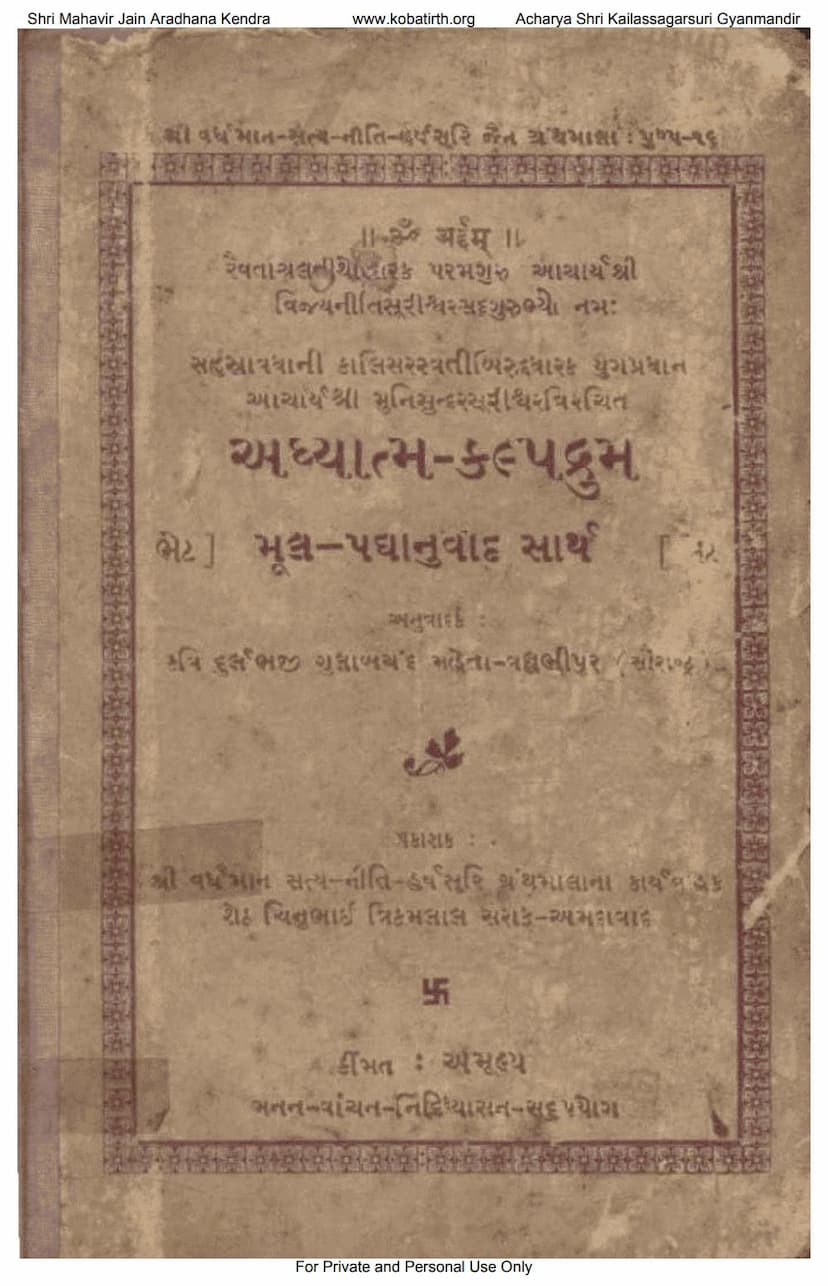Adhyatma Kalpadrum Mul Padyanuvad Sarth
Added to library: September 1, 2025

Summary
This document is the Gujarati translation of "Adhyatma Kalpadrum," a significant Jain text authored by Acharya Muni Sundara Surishwar. The translation and commentary are by Durlabhji Gulabchand Mehta. The book is published by Vardhaman Satya Niti Harshsuri Granthmala.
Here's a breakdown of the content:
Core Subject: The text focuses on Adhyatma (Spirituality), aiming to guide individuals towards self-realization and liberation (Moksha) through a deep understanding of Jain philosophy and practices. The title "Adhyatma Kalpadrum" itself suggests a wish-fulfilling tree of spirituality.
Author and Translator:
- Original Author: Acharya Muni Sundara Surishwar, a renowned Jain scholar and poet, known for his vast knowledge and spiritual depth.
- Translator/Commentator: Durlabhji Gulabchand Mehta, a 75-year-old poet from Vallabhipur, Saurashtra. He has translated the original Sanskrit verses into Gujarati poetry (Harigeet meter) and provided commentary.
Key Themes and Structure: The book is structured into 16 chapters (Adhikaras), each focusing on a different aspect of spiritual development and detachment from worldly affairs. These chapters cover a wide range of topics essential for a Jain spiritual path:
- Samata (Equanimity): Cultivating mental balance and indifference towards worldly dualities.
- Stri Mamtvamochana (Detachment from Wife/Woman): Understanding the impermanence and illusory nature of attachment to women.
- Apatya Mamtvamochana (Detachment from Children): Similarly, releasing attachment to children.
- Dhan Mamtvamochana (Detachment from Wealth): Recognizing the transient nature of wealth and its inability to provide true happiness or salvation.
- Deha Mamtvamochana (Detachment from the Body): Understanding the body as a temporary vessel and the soul as the eternal reality.
- Vishaya Pramada Tyaga (Renunciation of Sensory Indulgences and Negligence): Avoiding excessive indulgence in senses and refraining from negligence in spiritual practices.
- Kashaya Tyaga (Renunciation of Passions): Overcoming anger, ego, deceit, and greed, which are seen as impediments to spiritual progress.
- Shastra Abhyasa (Study of Scriptures): Emphasizing the importance of studying sacred Jain texts for knowledge and guidance.
- Chitta Damana (Control of the Mind): Addressing the restless nature of the mind and providing methods for its subjugation.
- Vairagya Upadesha (Advice on Renunciation): Encouraging detachment from worldly pleasures and possessions.
- Dharma Shuddhi Upadesha (Advice on Purity of Dharma): Stressing the importance of pure intentions and actions in religious practices.
- Deva Guru Dharma Shuddhi (Purity of Deities, Gurus, and Dharma): Advocating for reverence towards pure Jain deities, enlightened gurus, and righteous conduct.
- Yati Shiksha Upadesha (Instruction for Ascetics): Guiding monks and ascetics on the path of renunciation and spiritual discipline.
- Mithyatva Niradha (Cessation of False Beliefs): Aiming to eradicate false beliefs and superstitions.
- Shubha Vritti Shiksha (Instruction for Virtuous Conduct): Encouraging good behavior and righteous actions.
- Samya Sarvasva (Essence of Equanimity): Highlighting equanimity as the ultimate principle and goal of spirituality.
Supporting Content:
- Praise for Gurus: The book begins with verses praising various esteemed Jain gurus, including Acharya Shri Vijay Nitisurishwar and Acharya Shri Vijay Mahendra Surishwar, highlighting their spiritual contributions and guidance.
- Dedication: The book is dedicated to the memory of Seth Chimanlal Dahyabhai Parikh of Kapadvanj, whose wife Maya Behn provided financial assistance for its publication.
- Garbha Bahoteri (108 Verses on Gestation): A significant portion of the book contains verses detailing the painful and impure process of gestation and birth, serving as a stark reminder of the suffering in the cycle of existence and the need for spiritual seeking.
- Ten Examples of Human Birth's Rarity: The text includes ten illustrative examples demonstrating how difficult it is to attain a human birth, thereby emphasizing the preciousness of this opportunity for spiritual advancement.
- Brief Biography of Nami Rajarshi: A short account of King Nami's spiritual journey is included, illustrating the power of detachment and renunciation.
Philosophical Underpinnings: The text draws heavily on Jain principles such as:
- Ahimsa (Non-violence): As a foundational principle for all actions.
- Vairagya (Detachment): The need to detach from worldly pleasures, possessions, and relationships.
- Anekantavada (Many-sidedness): Understanding reality from multiple perspectives.
- Karma Theory: The cause and effect of actions and their impact on the soul's journey.
- The Stages of Spiritual Progress (Gunasthanas): Implicitly guiding readers towards higher spiritual states.
- The Importance of Right Faith, Knowledge, and Conduct (Samyak Darshan, Gyan, Charitra): The core path to liberation.
Overall Purpose: "Adhyatma Kalpadrum Mul Padyanuvad Sarth" serves as a comprehensive guide for Jains seeking spiritual upliftment. It aims to inspire renunciation, promote ethical conduct, deepen scriptural understanding, and ultimately lead the reader towards the ultimate goal of Moksha through the cultivation of spiritual knowledge and practices. The poetic translation makes these profound spiritual teachings accessible and engaging for a wider audience.